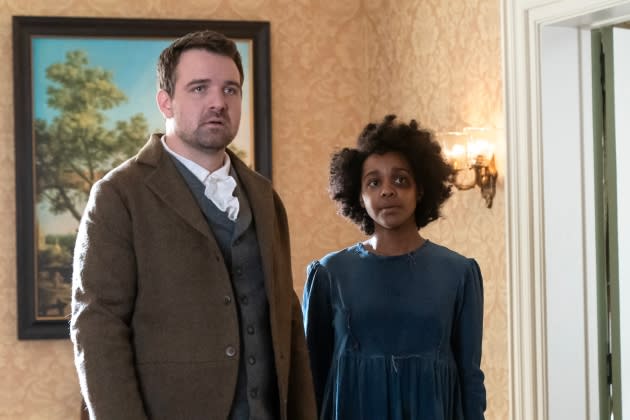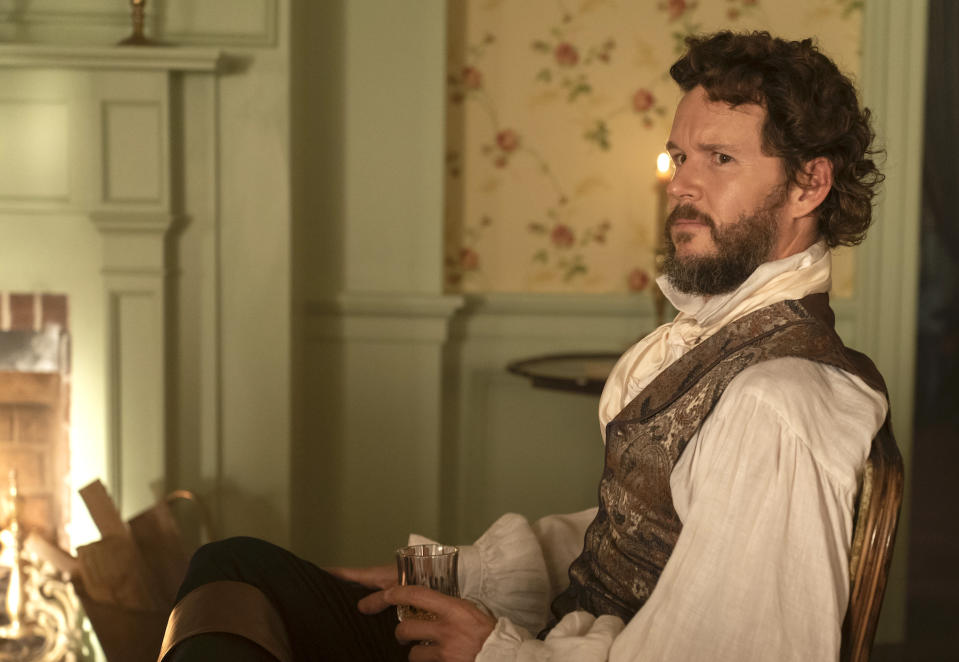‘Kindred’ Is a Time-Traveling Slavery Series That Fails to Do Octavia Butler Justice
- Oops!Something went wrong.Please try again later.
- Oops!Something went wrong.Please try again later.

In the new FX drama Kindred, a young Black woman named Dana finds herself time-traveling back and forth between Los Angeles in 2016 to a slave plantation in early 19th century Maryland. On some of these trips, Dana (Mallori Johnson) takes along Kevin (Micah Stock), a white man she has only just started dating, out of an understandable fear of being in that time and place on her own. For the most part, both are horrified to be there. But there is a peaceful moment during one of their longer visits when they are surprised to recognize that the plantation has begun to feel more real than their lives 200 years in the future.
Viewers watching the series, which playwright Branden Jacobs-Jenkins has adapted from Octavia Butler’s acclaimed 1979 novel, may find themselves having the opposite reaction. Though the show spends the bulk of its time on the plantation, it feels far more vivid, complex, and interesting during our periodic glimpses of the modern world.
More from Rolling Stone
'Emancipation' Isn't Will Smith's Big Redemption Tour. It's a B-Movie About Slavery
How to Watch 'American Horror Story: NYC' -- and Binge the Entire Series for Free
The premiere episode, written by Jacobs-Jenkins and directed by Janicza Bravo (Zola), takes place largely in 2016. Dana has struggled to find direction and peace since her parents died in a car crash, and has recently decided to sell the family brownstone in New York, buy a house in LA, and attempt to break into the TV business as a writer. She chafes under the judgmental gaze of her Aunt Denise (Eisa Davis) and Uncle Alan (Charles Parnell), as well as the thinly-veiled racism of the Karen next door (she is technically named Hermione, and is played by Brooke Bloom, who already was a Karen earlier this fall on Atlanta). But she and Kevin get along surprisingly well when he gives her a lift home from a bar after her phone dies, and she feels confident in her ability to master screenwriting by diagramming the plots of old episodes of Dynasty. All in all, things are going just fine for her prior to becoming unstuck in time.
The character work, the chemistry between Johnson and Stock, and the sense of creeping dread that comes from her brief journeys to the plantation are all very effective early on — almost too effective. Once the season evolves from toggling back and forth between the two eras and devotes itself to a few extended stays in 1815, Kindred quickly begins to drag, as if it doesn’t want to be in this time and place any more than Dana or Kevin initially do.
“There’s gotta be rules to this thing,” Kevin insists at one point, and the season gradually explains them. The most important is that Dana is somehow linked to Rufus (David Alexander Kaplan), the son of abusive plantation owner Thomas (Ryan Kwanten from True Blood) and the emotionally fragile Margaret (Gayle Rankin from GLOW). Dana’s mission, it seems, is to protect Rufus, and perhaps one or more of the enslaved Black people under Tom’s control. She gets some help from Kevin, and from a savvy free woman named Olivia (Sheria Irving), but the burden falls mostly on herself.
The problem is that, other than Olivia, none of the 1815 characters are nearly as well-drawn as the ones we see in the 21st century. Tom is a one-note monster(*). Margaret is only slightly less of a caricature. And many of the enslaved characters — particularly the young women — exist almost entirely as plot devices, to the point where it’s hard to keep track of which one is in danger during any of Dana’s trips, and why. And the added time spent there as the season moves along does little to deepen our understanding of them.
(*) The balancing act with any stories set in the days of slavery is to find a way to make the white pro-slavery character dramatically interesting without actually sympathizing with them. Some recent treatments have pulled it off, like Joel Edgerton’s remorseless slave-hunter character from Barry Jenkins’ The Underground Railroad adaptation. Tom, though, is a cartoon villain incapable of sustaining the amount of time devoted to him.

There is obvious tension and suspense in exactly how Dana and Kevin will talk themselves out of various problems, and Mallori Johnson (a TV novice seen earlier this year in a supporting role in Apple’s WeCrashed) is more than up to the burden of how much she is required to say without words, and how much the show needs her as its charismatic center. And despite its high-concept, Kindred does not flinch in the slightest from the physical and psychological terror of an enslaved life.
But aside from some intentionally stomach-churning scenes of violence — which include an on-camera whipping and a just barely off-camera rape — the 1815 sequences are badly lacking in emotional focus compared to what’s happening in 2016, even though the plantation story is the entire point of all this. Dana discovers an unexpected link to Olivia that complicates the whole situation, yet I spent many of their scenes wondering what Denise would think about all this if Dana ever managed to convince her of what was happening.
Dana and Kevin desperately want to escape the plantation forever, so it is perhaps not surprising that Kindred may have unconsciously given its audience the same desire. But it makes for a viewing experience that’s much less engaging than you would expect, given the enduring legacy of its source material.
The entire first season of Kindred begins streaming December 13 on Hulu. I’ve seen all eight episodes.
Best of Rolling Stone

